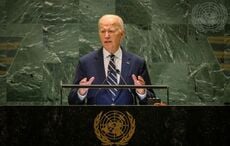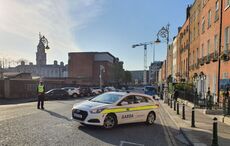READMORE- Irish Finance Minister's drastic overhaul of banking sector
Shares in Bank of Ireland rose threefold on Friday morning as markets reacted to the fifth – and potentially final – Irish bank bail-out.
Bank of Ireland shares rose almost 32 per cent to 29 cent shortly after 9.15am Irish time as the stock resumed trading.
AIB began the morning session on the Dublin exchange by falling as low as 14.1 cent, but reversed the losses and by 9.15am were trading 27 per cent higher at 24 cent.
The shares climbed after confirmation that the potential total cost of bailing out the Irish banks – in a worst case scenario - rose to over $100billion on Thursday when the Central Bank announced the staggering results of stress tests on the country’s main financial institutions.
Finance Minister Michael Noonan reacted with the announcement of radical plans to change the face of Irish banking forever in a move is designed to win back confidence in Ireland on the international money markets.
The new banking landscape focuses solely on two main banks to serve the country, namely AIB and Bank of Ireland after the government signaled bondholders will not be hit under the scheme.
In a joint statement, the EU, the ECB and the IMF said the proposal was: “A major step toward restoring the Irish banking system to health.”
The three governing bodies also promised to: “Provide whatever money was needed comfortably under the program supported by the EU and IMF.”
As part of the restructuring the EBS group will be merged with AIB, the country’s second-largest bank.
Bank of Ireland must raise €4.2bn by mid-June or it will be nationalized like AIB while Irish Life & Permanent has been given two weeks to draw up a plan to sell its life business and shrink the group into a small bank.
AIB/EBS and Bank of Ireland must lend €12bn to small and medium sized businesses with no bank bonuses to be paid in the future.
The plan creates ‘two new strong universal pillar banks’ in AIB and Bank of Ireland according to Minister Noonan.
“Bank of Ireland will become a significantly more domestically-focused bank and retain its businesses in Northern Ireland, its post office deposit venture in the United Kingdom and limited capital market businesses,” he said.
“The second pillar will combine the strengths of AIB and EBS and again, this will be a largely domestically-focused bank, retaining its Northern Ireland operations and certain deposit-funded operations in the UK.”
Minister Noonan promised no half measure in the plan to finally draw a line under the banking crisis and again criticized the Fianna Fail decision to guarantee the debts of the six main Irish banks two and a half years ago.
“Tuesday the 30th September, 2008, will go down in history as the blackest day in Ireland since the civil war broke out,” said Minister Noonan. “The banks were too big for the economy.
“The JCB and the swinging crane had become the logos of the banks, and Irish bankers were as likely to be funding apartment blocks on the Black Sea or dabbling in property schemes in Singapore as they were to be investing in the Irish economy.
“The previous government ducked and dived and procrastinated as it lurched from one crisis to another.”
Central Bank Governor Patrick Honohan admitted that the decision to pump more taxpayers’ cash into the banks isn’t fair but claimed the country has no choice.
“This is the best way forward, but there are no good ways forward,” said Prof Honohan.
“It doesn’t score highly on fairness, another way forward might score a few more fairness points, but it would be biting off nose to spite face.”
Goodbody economist Dermot O’Leary described the results of the stress tests and the bank restructuring as: “The most important milestone in returning the sector to health.”
He added: “The rigorous analysis and scale of published detail provides an important added layer of transparency that was missing in previous tests in Europe in general and in Ireland in particular. We would see these as a step in the right direction but further help from Europe is likely to be required.
“With significant capital buffers going to be in place in the banks, solvency should not be a concern. However, liquidity is still an issue; the absence of an announcement by the ECB on a longer-term liquidity facility for the Irish banking system was a disappointment. However, we would not rule out the possibility of it just yet.”
READMORE- Irish Finance Minister's drastic overhaul of banking sector




Comments